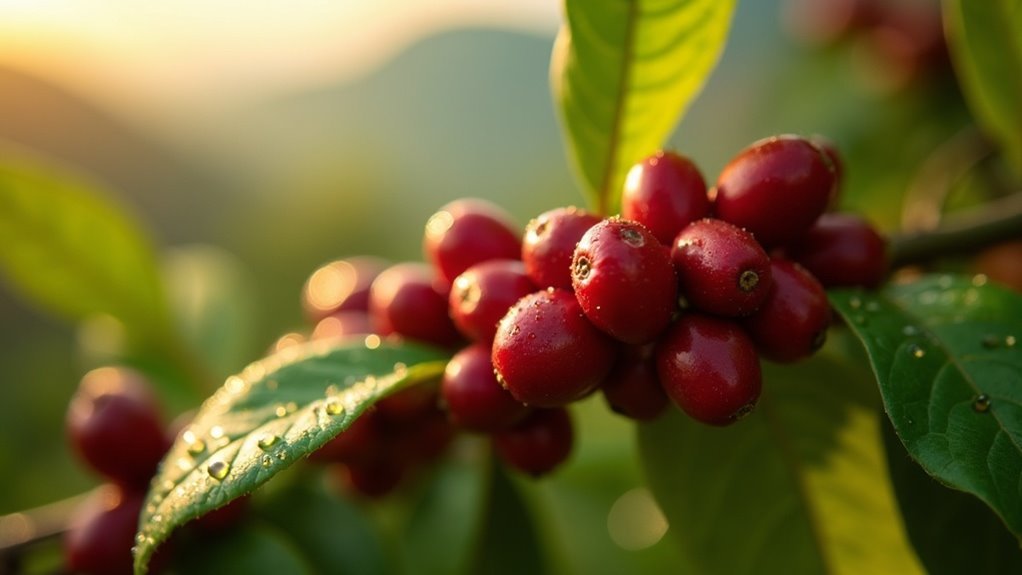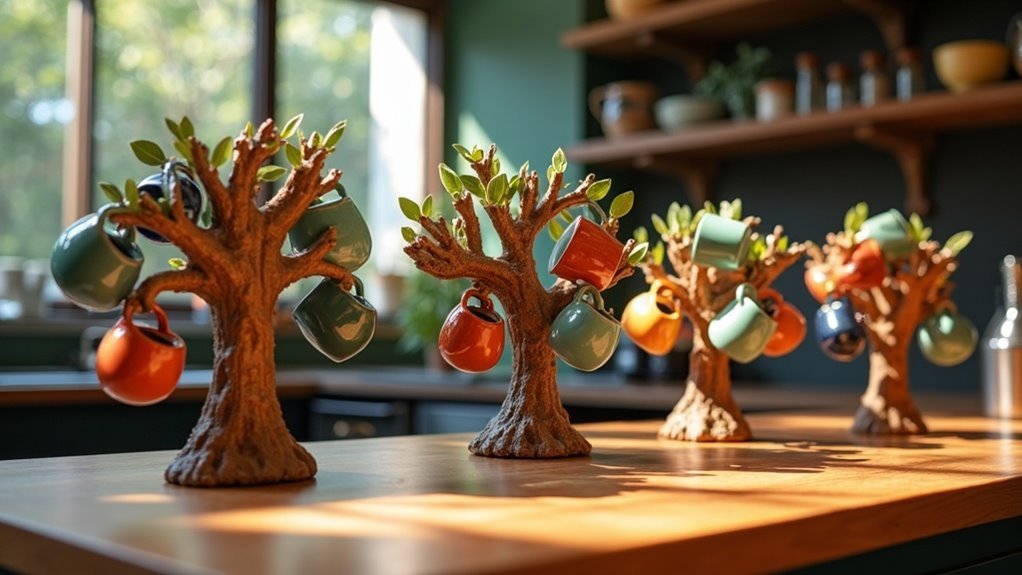Starmaya coffee is an F1 hybrid varietal that boasts a 30% higher yield than its parent varieties, making it commercially viable. With a cupping score of 82.5, it ranks as specialty coffee, showcasing strong sweetness and balanced acidity. Developed using male-sterility techniques, its efficient seed propagation allows for high productivity. This innovative varietal also demonstrates resistance to coffee leaf rust, enhancing sustainability. There’s much more behind its development and implications for coffee cultivation that you might find intriguing.
Key Takeaways
- Starmaya is the first commercially viable F1 hybrid coffee variety created by crossbreeding the Marsellesa variety with a male-sterile Ethiopian/Sudanese landrace.
- It boasts a yield potential that is 30% higher than its parent varieties, significantly enhancing production efficiency for coffee farmers.
- With a cupping score of 82.5, Starmaya is classified as specialty coffee, offering exceptional flavor and aroma characteristics that coffee enthusiasts appreciate.
- The variety exhibits strong resistance to coffee leaf rust and is currently being researched for its resistance to Coffee Berry Disease and nematodes.
- Developed through a collaborative breeding program by ECOM and CIRAD, Starmaya supports sustainable coffee production practices and benefits smallholder farmers in the coffee industry.
Overview of Starmaya Coffee
Starmaya coffee marks a groundbreaking development in the world of coffee cultivation, being the first commercially viable F1 hybrid variety that can be propagated by seed. This innovative coffee type was created through the crossbreeding of the Marsellesa variety with a male-sterile Ethiopian or Sudanese landrace.
Starmaya offers a yield potential that’s 30% higher than its parent varieties, making it a standout choice for coffee growers. In terms of flavor, it impressively scores 82.5, classifying it as specialty coffee.
Furthermore, Starmaya demonstrates strong resistance to coffee leaf rust, although its resistance to Coffee Berry Disease and nematodes is still under investigation. Grown at medium altitudes, this remarkable coffee can yield up to half a million seeds per hectare each year, emphasizing its potential impact on the coffee industry.
History of Starmaya Development
Developed from a male-sterile mutant known as CIR-SM01, the journey of Starmaya coffee began in 2001, marking a significant advancement in hybrid coffee cultivation.
This F1 hybrid emerged from a breeding program between ECOM and CIRAD, combining CIR-SM01 with four dwarf-type cultivars. The result? Seeds that yield 30% more green beans than the parent variety, Marsellesa, while maintaining superior quality characteristics and resistance to coffee leaf rust.
Starmaya’s successful field trials in Nicaragua underscored its potential to revolutionize coffee production, offering a commercially viable option that can be propagated by seed, enhancing sustainability in the coffee industry.
Cup Quality and Characteristics
The exceptional cup quality of Starmaya coffee is a testament to its meticulous breeding and cultivation methods.
With a cupping score of 82.5, it surpasses the specialty coffee threshold, showcasing its high quality.
Starmaya features an aroma score of 7.63, a flavor score of 7.63, and an impressive sweetness rating of 8.88, all contributing to its clean and uniform cup profile.
The acidity and body scores of 7.5 further enhance its appealing flavor characteristics.
Grown at medium altitudes, Starmaya delivers a superior beverage quality, making it a standout choice for coffee enthusiasts who seek a refined and gratifying experience.
Breeding and Propagation Techniques
Utilizing a male sterility-based reproductive system, Starmaya coffee is propagated efficiently through seed, streamlining the breeding process and eliminating the need for manual removal of male flower parts.
This innovative approach significantly enhances hybrid production, yielding notable benefits for coffee cultivation:
- The seed garden employs CIR-SM01 as the male-sterile parent and Marsellesa as the pollen donor in a 1:4 ratio, ensuring a robust genetic mix.
- An optimized planting density of 4,000 trees per hectare maximizes land usage and productivity.
- The garden has the potential to produce an estimated half a million F1 hybrid seeds per hectare annually, offering a more cost-effective alternative compared to somatic embryogenesis methods.
This system exemplifies effective propagation techniques for this unique coffee varietal, contributing to the advancement of coffee breeding and production.
Implications for Coffee Research and Development
As Starmaya coffee becomes a part of World Coffee Research’s initiatives, its implications for coffee research and development grow more important. This F1 hybrid illustrates the potential of male-sterile varieties to enhance breeding techniques, boost coffee production, and assist smallholder farmers. Successful trials conducted in Nicaragua demonstrate its resilience against diseases, particularly coffee leaf rust, thereby fostering sustainable production methods.
| Aspect | Starmaya Benefits | Research Focus |
|---|---|---|
| Yield | High yields | Breeding techniques |
| Disease Resistance | Effective against leaf rust | Hybrid development |
| Accessibility | Supports smallholder farmers | Affordable varieties |
| Sustainability | Promotes eco-friendly practices | Climate resilience |
| Flavor Profile | Desirable taste | Quality improvements |








